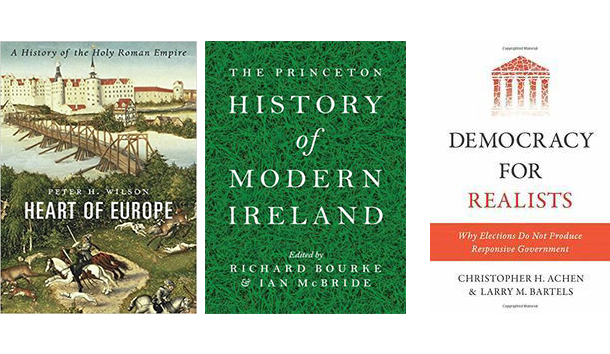Heart of Europe: A History of the Holy Roman Empire, by Peter H. Wilson (Cambridge, MA: Belknap/Harvard, 942 pp., $39.95). Professor Wilson of Oxford University argues that the history of the Sanctum Imperium Romanum, despite its centrality to the history of Europe and its immense longevity (it lasted for more than a millennium, twice as long as the Roman Empire), has commonly been written piecemeal, as the history of its component parts that, in modern times, became Germany and ten other states. This is a mistake, Wilson says, as the Holy Roman Empire’s history is a significant part of the Continent’s collective development. Because the empire was neither a nation-state nor a federation of states in the modern sense, it has been viewed by writers like Pufendorf, Voltaire, and James Madison as a “monstrosity,” an institutional failure, and, as Voltaire memorably put it, a laughable misnomer (“neither holy, Roman, nor an empire”). Their criticism goes for modern Germany herself, seen by modern historians as “a delayed nation.” But, as Wilson shows, the empire was not a failure but a unique historical creation; an empire lacking a stable heartland, a capital city, and centralized political institutions. The imperial foundation, or original justification, was its conceptual function as Western Christianity’s “secular arm” as worldly protector of the Church, the Pope, and Christian Europeans. While the organizational history of Europe has been characterized at the universal level by a transcendental ideal, at the middling one by daily activity, and at the intermediate one by the sovereign state, Wilson explains how the empire thrived with only the first two of these, but by realizing the third in the 13th century put in play the forces that led to its demise when Emperor Francis II dissolved it in 1806. In a world in which state-building became the great historical-progressive project, it was an empire populated by people who regarded it as transcending its ruler and were content to live without a centralized superstructure, being satisfied instead with consensus across the component parts in preference to direct reach from the political center. Additionally,
both the governance and patterns of identity within the Empire were closely entwined with socio-economic developments, notably the emergence of a corporate social structure combining both hierarchical-authoritarian and horizontal-associative elements,
a structure largely replicated at every level of the imperial social and political order. As a direct result, the Enlightenment’s idea of “equality,” when it arrived, was fundamentally foreign to the empire’s former parts. In a final chapter, Wilson considers the Holy Roman Empire as the conscious model for the European Union, whose plausibility he finds unconvincing. Heart of Europe is an important work of history, a considerable intellectual achievement.
The Princeton History of Modern Ireland, edited by Richard Bourke and Ian McBride (Princeton, NJ: Princeton University Press, 526 pp., $45.00). This is a wonderful volume of very sound and excellent essays, beautifully written and introduced by an admirably clear and concise political history from the 16th to the 21st century by Professor Bourke of Queen Mary University of London. (Bourke is the author of the superb Empire and Revolution: The Political Life of Edmund Burke, reviewed in this space in the June 2016 number of Chronicles.) The essays that follow cover every conceivable aspect of Irish history in that period, including Ireland’s chronological, political, social, economic, intellectual, religious, cultural, historiographical, and linguistic development across three centuries. A short notice like this one precludes careful consideration of any or all of the contributions to the volume, but I was particularly struck by Daniel Carey’s “Intellectual History: William King to Edmund Burke,” David Dwan’s “Cultural Developments: Young Ireland to Yeats,” Bourke’s “Historiography,” and Vincent Morley’s “The Irish Language.” All of the essays, however, are worthy of this superb collection of 22 examples of the best modern historical research and examination, itself a model for how academic writing in an illiterate age should be done.
Democracy for Realists: Why Elections Do Not Produce Responsive Government, by Christopher H. Achen and Larry M. Bartels (Princeton, NJ: Prince ton University Press, 390 pp., $29.95). The authors conclude, on the basis of detailed academic research, that what they call the “folk theory” of democracy—the idea that democratic government is “of the people, by the people, and for the people” voting as free and independent equals who, by registering their individual wills, ensure that the will of the majority is registered and heeded by government—is a sentimental falsehood. Voters, they say, do not choose a candidate after rational reflection but from a variety of emotional impulses, including “retrospective judgment” (basically, impressions derived from hindsight). Most importantly, their votes are determined by their sense of a particular group identity—racial, ethnic, class, religious—to which they are prepared to accommodate their opinions regarding specific issues of policy, and even to change them entirely. Conflict between groups, in other words, drives democratic politics, not the considered judgments of individuals. Achen’s and Bartels’s findings raise a number of interesting questions, among them whether the cure for democracy really is more democracy.
—Chilton Williamson, Jr.

Leave a Reply